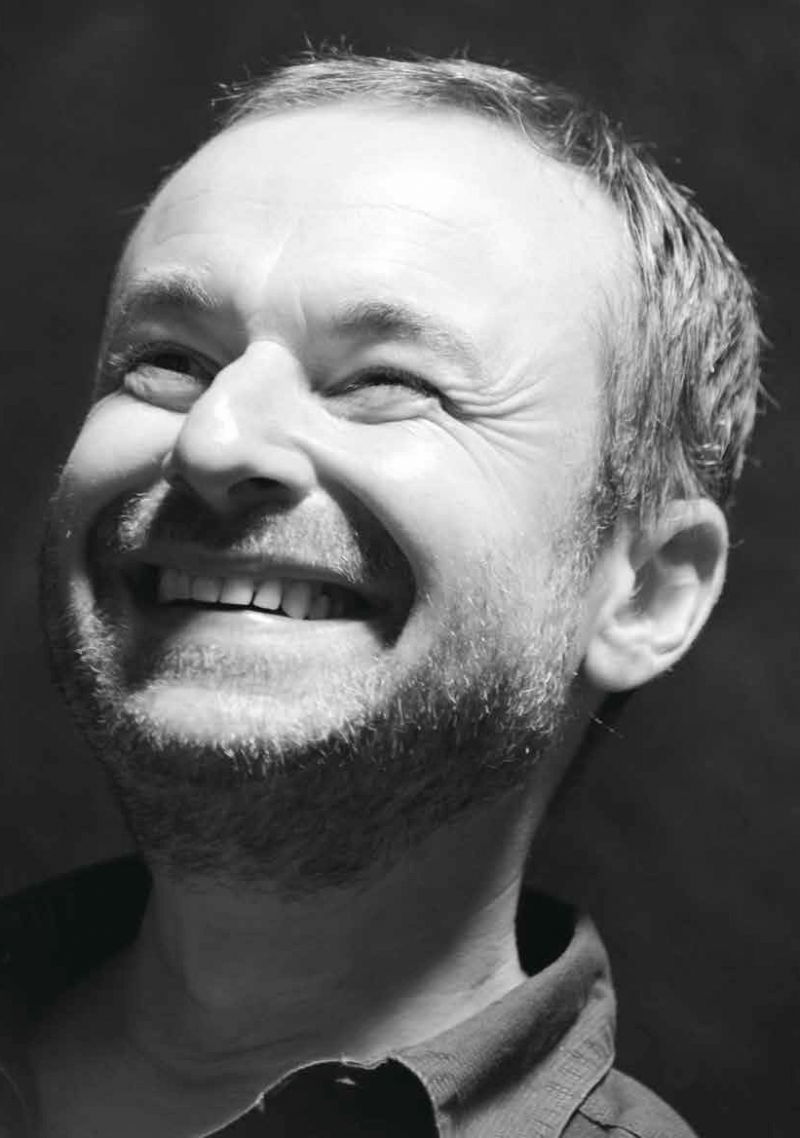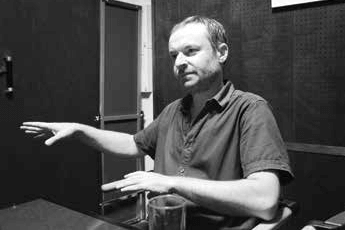Issue:

Daniel Eskenazi
by TYLER ROTHMAR
Long before he became a reporter covering business and economics, Daniel Eskenazi had an interest in people and their stories. A French speaking Swiss, Eskenazi was born in Lausanne and grew up in Geneva. A first close encounter with mass media came during his study of sociology and anthropology at the University of Lausanne, for which he travelled to Gabon to produce a paper on the role of radio in Gabonese culture and its link to oral tradition. While he did some writing for radio during that time, he was primarily working towards a critical understanding of the media’s role in society and censorship.
“Much of the culture that was in the tribes before, the telling of ancestral stories or announcements of deaths in the community, was broadcast on the radio,” he recalls. Even the televisions were used as radios people listened to them as they went about their day, but few watched.
After returning to Switzerland and briefly considering a career in anthropology, he settled on journalism “because it gives you a chance to travel, and you don’t have to be always in front of your desk.” In 1999 he began working for Swiss national radio in Geneva for a stint of hands on training. “I was the last guy who got to cut the tape on the reel to reel. Very soon after, it all became computerized,” he remembers.
Eskenazi began to learn the ropes during the two year period in which Swiss journalists are expected to apprentice with a media outlet. He freelanced with several organizations including the Swiss publications Banco and Bilan covering economy and finance, and noticed that the economy beat was a path less trodden among his peers. “The competition was not so hard compared to writing about politics, and many of the people who actually study economics in school don’t end up working as journalists,” he says.
A three month contract for Swiss newspaper Le Temps in Geneva in 2003 eventually led to work as a contract correspondent in Zurich covering economy and finance in 2004. He covered mainly industry and start ups, he says. “I’m always interested in new companies and how people make that transfer from university studies to entering the business market.”
As his girlfriend had lived in Japan since 2011, three years ago Eskenazi decided to close the gap of their long distance relationship. “I thought Tokyo would be a good destination, and I had already been here once for work, covering the airline industry, so I came over.”
Setting up shop as a freelancer was a challenge, he says, but after the Tohoku earthquake and Fukushima nuclear disaster, and the later launch of the prime minister’s “Abenomics” plan, there was an appetite in Switzerland for stories about Japan. Eskenazi continues to freelance for Le Temps, Bilan, and Efficience 21, and says there is still competition among French speaking correspondents covering Japan, especially now that interest in disaster related stories clusters chiefly around the March anniversary. As a result, he has expanded his repertoire by exploring video and photography and establishing a blog.
“I decided to start the blog almost out of frustration, because sometimes you want to sell an article but they don’t want it”

“I decided to start the blog almost out of frustration, because sometimes you want to sell an article but they don’t want it. So I said, ‘Okay, I’m going to write it, so at least it will be on my blog rather than on my hard drive.’” Eskenazi is now studying photography, a facet of his work that can also be found on his blog when it isn’t being sold along with his articles. “In this way I’ve been expanding my journalistic knowhow,” he says.
Joining the FCCJ was one of Eskenazi’s first moves after arriving in Japan, and he can be found working on the 19th floor most days, a habit he formed early on to avoid the noise of building construction beside his home. “The Club is quiet and a great place to get access to people and news,” he says, “and the library staff are very helpful.” Eskenazi has all but given up his study of Japanese, and will have to be content with speaking French, English, Spanish and German. “I’m okay with it,” he laughs.
He is active at the FCCJ as a member of both the Special Projects (SPC) and Professional Activities (PAC) committees, and would like to see more PAC events with CEOs. “In Europe, if a company is having problems, they want to speak about it, to address it. Here, it’s the opposite, and it seems many are afraid of the questions they will face from the foreign press. They want to have rules and know the questions in advance.
“We were lucky with animator Hayao Miyazaki,” he continues. “We arranged a press conference in his studio, and it was amazing.” Eskenazi wonders if the compromise of hosting press conferences at company HQs might help to land events with the CEOs of Toyota, Sony and Fanuc, but thinks it will take time. Mean while, he will continue to look for the human connection in stories about business, finance and green energy. “I’m always more interested in the stories than the numbers,” he says.
Tyler Rothmar is a Tokyo-based writer and editor.

